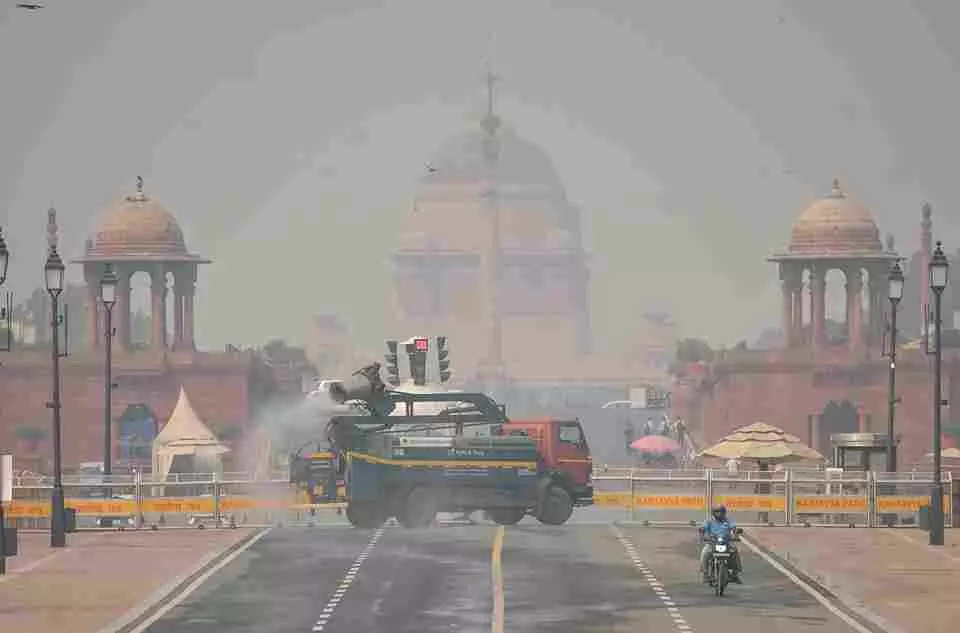
An anti-smog gun sprays water droplets to curb air pollution, with Rashtrapati Bhavan in the backdrop, as air quality deteriorates across northern India, in New Delhi, Tuesday, Oct. 21, 2025. Photo: PTI
Diwali pollutants drift across border; Pakistan’s Punjab worst hit
Severe smog enveloped Pakistan’s Punjab as pollutants from India’s Diwali firecrackers drifted across the border, worsening air in Lahore, Faisalabad and others

India’s Diwali fireworks has worsened the air quality not just in the capital but in many neighbouring Pakistani cities as well, including Lahore, Faisalabad, Gujranwala, Sahiwal, and Multan.
According to data provided by the Punjab Air Quality Monitoring Network, Pakistan’s Punjab province took the worst hit as pollutants from celebrations in India drifted across the border. This prompted the provincial administrations to initiate emergency responses.
Multiple factors
Pakistani officials blamed the current situation in Punjab to a combination of factors such as local emissions and pollutants drifting in from India, made worse by firecrackers, and low-speed winds, according to Dawn, a Karachi-based news group.
According to news reports, slow-speed winds carrying pollutants from New Delhi and other northern cities have played a major role in worsening air conditions in Pakistan’s Punjab. The winds blowing at speeds between 4 and 7 km/h carried the airborne particulate matter across the border, affecting Pakistani cities.
Lahore’s Air Quality Index (AQI) was recorded at 266, listing it as the second most polluted city globally, just after New Delhi, which topped the list.
Also Read: Delhi’s air quality in ‘red zone’; residents flout SC’s time limit for firecrackers on Diwali
Pakistan administration’s initiatives
To tackle the current situation, the Punjab government in Pakistan took several measures. They roped in nine relevant departments and formed smog response squads to conduct inspections of establishments and individuals who were allegedly polluting the air.
It also ordered the deployment of anti-smog guns and sprinkled water on key roads in Lahore.
Also Read: Delhi’s air quality worsens on Diwali amid stubble fire surge in Punjab
پہلے صرف سموگ کو مینج کرنے کیلئے کام کیا جاتا تھا لیکن پچھلے سال جب ہماری گورنمنٹ آئی تو وزیراعلی پنجاب مریم نواز نے مجھے بطور وزیر سموگ کو کم کرنے کی ذمہ داری سونپی لیکن اس وقت ہمارے پاس فورکاسٹنگ کا کوئی ٹول نہیں تھا نہ ڈیٹا تھا کوئی ٹیکنالوجی نہیں تھی کوئی انوائرمنٹل فورس نہیں… pic.twitter.com/Sfg0I713iT
— Marriyum Aurangzeb (@Marriyum_A) October 21, 2025
Lahore records poorest AQI
On the evening of October 20, Lahore was ranked the third most polluted city in the world with an AQI of 182, with New Delhi (213) and Kolkata (203) topping the list. Indian cities' air quality declined due to pollution caused by Diwali firecrackers.
According to the Swiss air quality monitoring group IQAir, Lahore reported PM2.5 concentrations at 187 mg/m, which was around 37 times higher than the World Health Organisations' recommendation.
Also Read: Delhi-NCR air quality slips to ‘very poor’; GRAP Stage II invoked
On X, Marriyum Aurangzeb, a minister in Pakistan’s Punjab government, said that the government implemented a comprehensive plan to tackle the situation.
“Lahore’s AQI is expected to remain between 210 and 230. Anti-smog guns and water sprinkling operations have been ongoing at polluted hotspots since the night,” she noted.
Meanwhile, the Lahore police have arrested 83 individuals in their anti-smog crackdown, including those who are behind the emissions from factories and those responsible for burning tyres and other wastes, said reports.
India's SC gives nod for firecrackers
It is also worth noting that this comes amid the permission given by the Supreme Court of India this year allowing the use of green firecrackers in Delhi-NCR between 8 pm and 10 pm on Diwali, which was celebrated on Monday (October 21). However, many violated the court’s directive, with firecracker use continuing late into the night.
According to hourly data from the Central Pollution Control Board (CPCB), Delhi's AQI stood at 349 at 12 am and 348 at 1 am.

